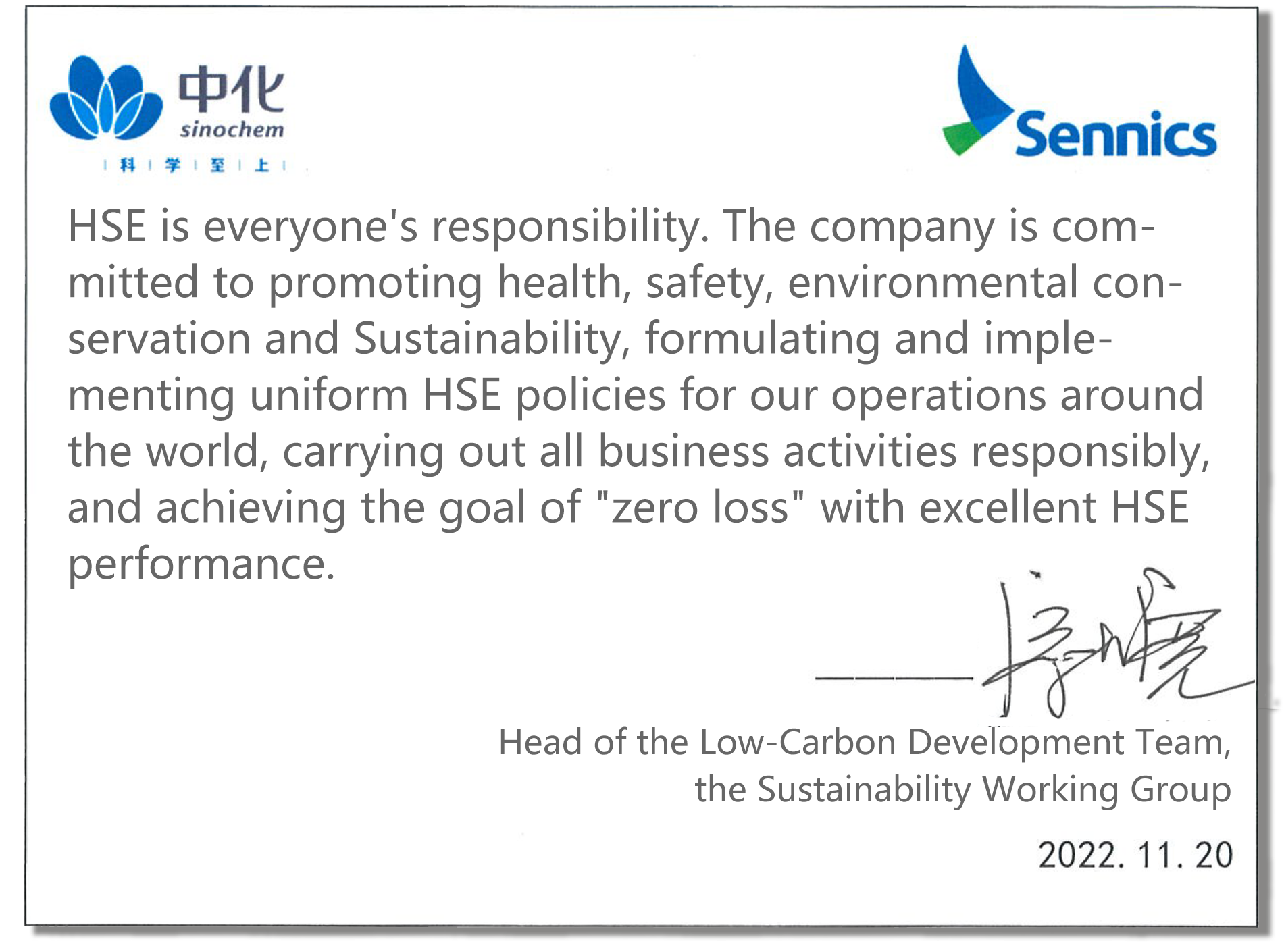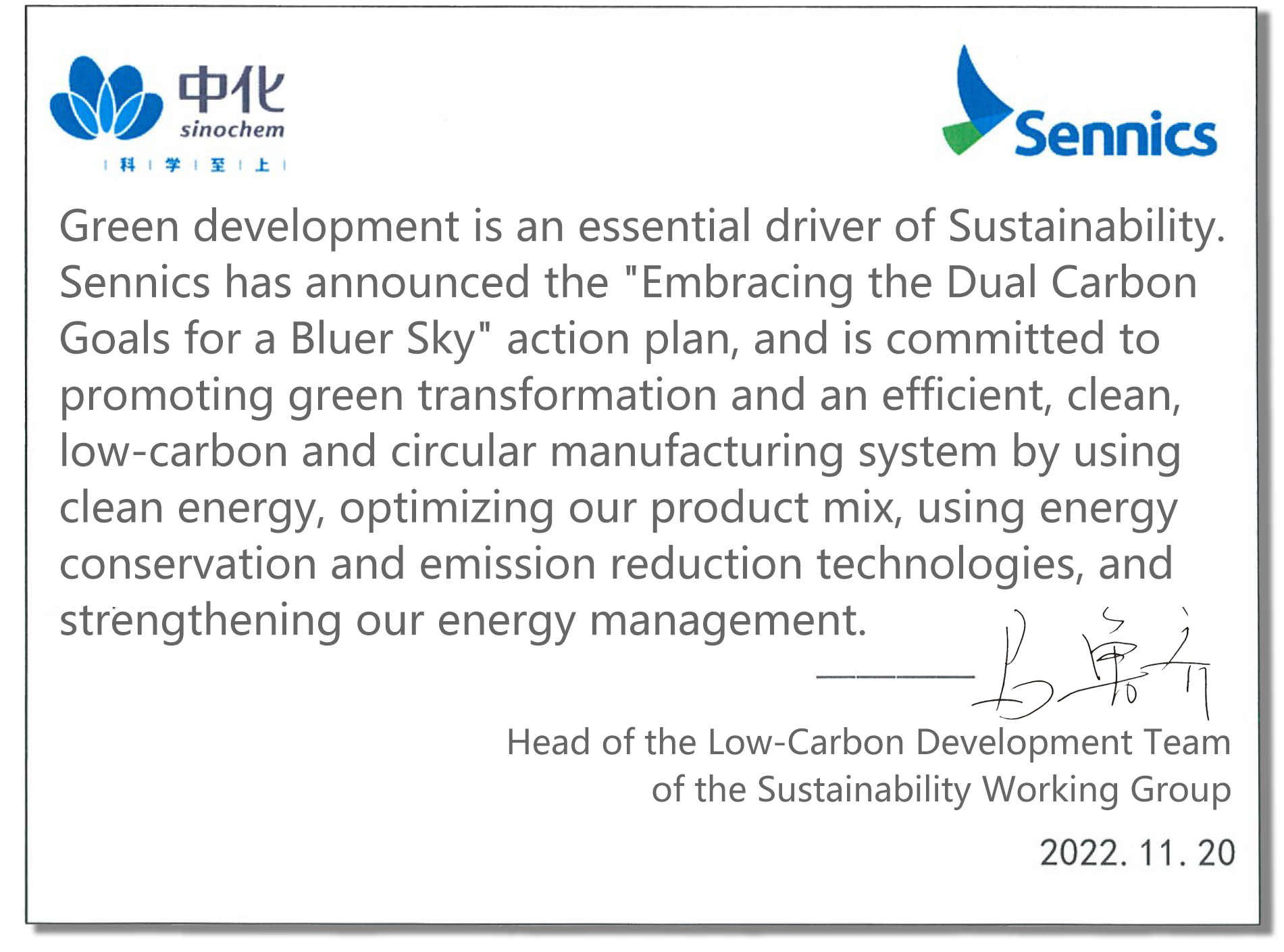Safe production and environmental protection are not only the lifeline of a chemical enterprise, but also an important basis for the stable and healthy development of the economy and society. Sennics strictly follows national and regional environmental regulations, always regards safety and environmental management as the core elements of production and operation, and continuously improves its essential HSE competitiveness. The QHSE Team, the Low-Carbon Development Team, and the Innovative Development Team under the Sustainability Working Group are responsible for promoting and implementing the relevant work, including: improving the HSE management system and the environmental management system, setting environmental management targets, signing the annual target liability statement, identifying and managing environmental risks and issues on a regular basis, and conducting environment-related KPI assessment, to ensure that the targets are met. Sinochem Holdings' FORUS system is fully implemented at Sennics; all factories under Sennics have been certified to the ISO 14001 Environmental Management System (EMS) standard; and multiple measures have been taken to improve our environmental management continuously. The purpose is to provide a strong support for the company to achieve healthy, safe and green development.
Policy: We treat life and the environment as top priorities, and adopt loss control methodology for achieving continuous improvement.


1. Cutting energy consumption and carbon emissions
Sennics is committed to "green and ultimate" development by embracing cutting-edge green technologies, promoting the application of energy-saving and low-carbon technologies, and reducing energy consumption and the generation of greenhouse gases (GHGs). We will strive to achieve carbon peak by 2030 and carbon neutrality by 2060, to meet the energy consumption intensity and general control goals, and to continuously reduce GHG emissions through: 1) optimizing our product mix; 2) developing eco-friendly and green technologies; 3) promoting technological transformation and the application of low-energy equipment; 4) coordinating energy use across our parks; 5) striving to achieve operational excellence and create a green supply chain; and 6) promoting energy performance evaluation of new projects.
2. Saving water
Sennics is committed to the rational use of water, improving our water management system, and reducing water use and pollution from water collection, use, and recycling. We will reduce water consumption by optimizing production, gradually decommissioning or transforming the processes and equipment that produce waste water, adopting comprehensive prevention and control measures, and promoting the reuse of water resource.
3. Conserving biodiversity
Biodiversity is an important basis for the survival and development of human beings, and also the basis for us to achieve Sustainability in the industry. Sennics pays high attention to biodiversity. We will conduct research and communication on biodiversity, identify biodiversity risks based on biodiversity impact and dependency assessments, and determine biodiversity management priorities in line with the UN Sustainability Goals (SDGs). In addition, we will plan and implement relevant management actions, and further integrate biodiversity conservation into our existing management systems.
4. Reducing pollutant discharge
Pollutant discharge is the main cause of negative impact on the environment and the waste of resources and energy. Reducing pollutant discharge is essential for realizing Sustainability. Sennics is committed to reducing and eliminating the harm to human health and the environment by: proactively promoting clean production and reducing pollution from the source; improving resource utilization; and reducing or avoiding the generation and emission of pollutants in the process of production, service and product use.
5. Controlling noise pollution
Noise poses threats to the health and safety of our people in the operation sites, and has a negative impact on the surrounding ecological environment. Sennics is committed to creating a low-noise environment and reducing the impact of noise through the use of low noise equipment, noise monitoring and control procedures, and proper operation planning.
6. Reducing material consumption
Sennics strives to improve resource utilization and reduce material consumption by promoting clean production practices, improving raw material management, promoting the use of clean energy and materials, improving product design, adopting advanced technologies and equipment, and comprehensively recycling and reusing materials.
7. Standardizing hazardous material management
Sennics saves no effort to protect our people, property, and the surrounding ecological environment during our production and operation by following relevant laws and regulations, implementing the Hazardous Chemicals Management and Control Procedures regarding the disposal of hazardous chemicals and wastes, practicing effective and safe management over hazardous chemicals used by the company to lower the risks arising from the procurement, transportation, inspection, use, storage, sales and disposal of hazardous chemicals, and preventing accidents involving hazardous chemicals.
8. Adopting proper waste disposal
Sennics disposes wastes following relevant laws and regulations, and sees to it that any pollutant is discharged in accordance with applicable national or local standards. We classify and manage our wastes according to the management requirements of general industrial solid wastes and hazardous wastes; and collect, store, transport and reuse the wastes in proper manners. We take measures to minimize environmental pollution, including the measures to prevent emission, loss or seepage.
9. Providing eco-friendly products and services
Sennics is committed to: providing eco-friendly products and services to reduce their direct impacts on the environment; using green and safe raw materials, applying compact, safe, energy-saving, lower-consumption and eco-friendly processes; developing more energy-efficient products; developing and applying renewable resources; and producing biodegradable or biobased products to achieve eco-friendly production and application; and providing high-performance additives to improve material stability, thereby prolonging the service life and improve the performance of products.
10. Disposing EOL products with more eco-friendly approaches
Sennics takes eco-friendly approaches to end-of-life (EOL) products by: conducting lifecycle analysis to maximize the recovery and recycling of products and materials at the end of their service; developing product performance improvement schemes according to the application requirements; reducing the use of composite materials; making plastic and rubber products easier to recycle; developing stabilizer schemes to improve the performance of recycled plastics and rubber products.
11. Improving consumer health and safety
Sennics guarantees that its products comply with relevant laws and regulations in terms of HSE management, and is committed to serving consumers with the highest quality standard. The company evaluates, records and manages product-related safety risks, implements a supervision plan for its products across their entire lifecycles, continuously improves product safety and quality; guarantees to provide adequate HSE data, proactively collects and responds to consumer complaints on product safety and health, and ensures that its products are produced, stored, transported, used and disposed in a manner that pays high attention to HSE management.
12. Implementing sustainable consumption
Sennics strives to: deliver innovative and green solutions, provide products and services that benefit the society and environment throughout their lifecycles, enhance the recycling of resources, design products and packaging that are easier to use, reuse, repair or recycle, and promote technology innovation and application in the fields of energy conservation, clean production and recycling. It also practices responsible marketing and advertising, provides consumers with appropriate education and packaging and waste recycling services, and drives green value creation across the whole value chain.